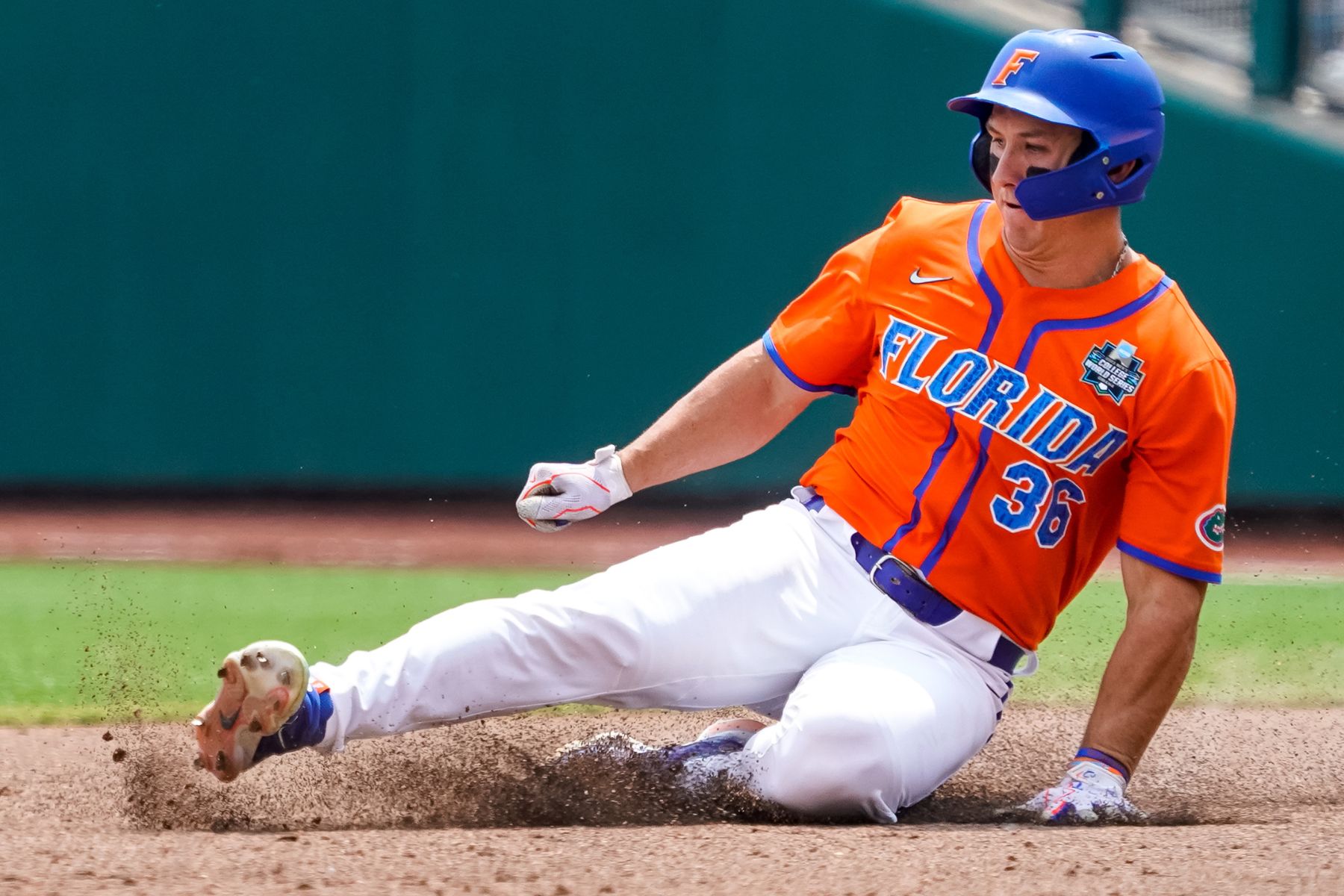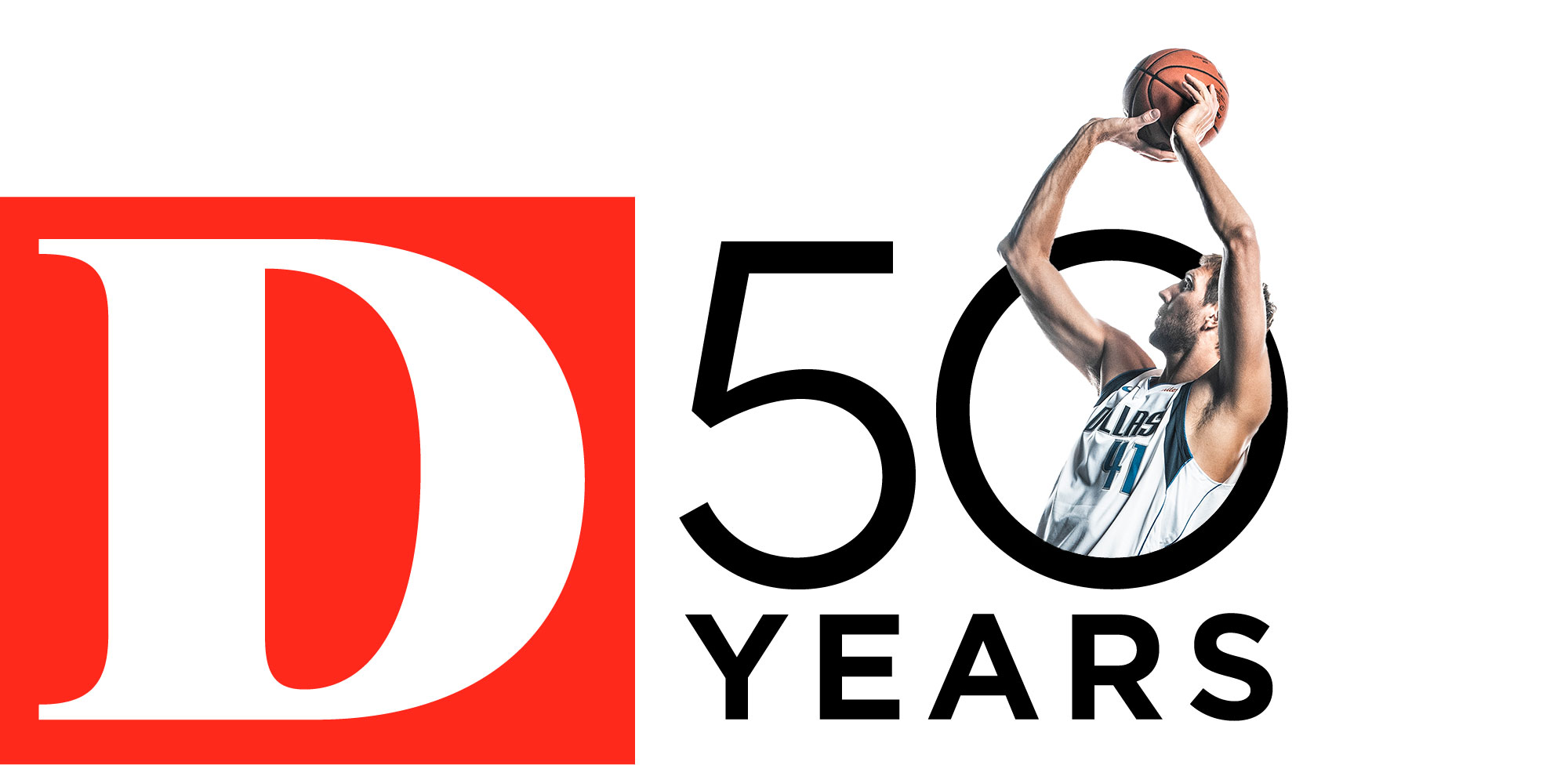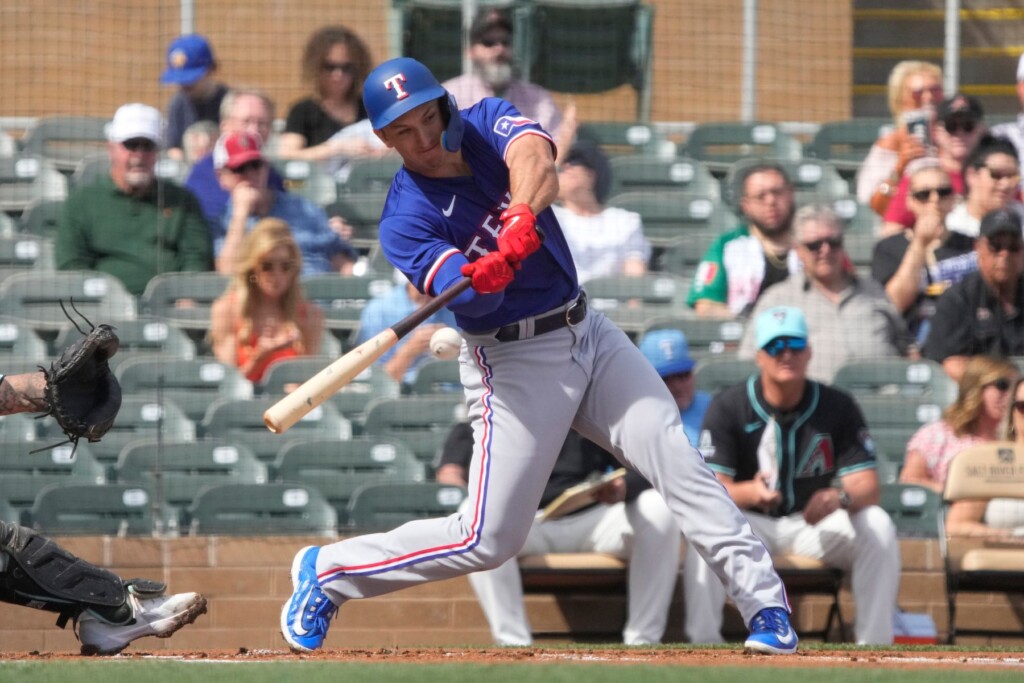The response was short and dismissive.
It was Halloween, one day after the Texas Rangers suffered what might have been a crucial blow. The Rangers claimed a 2-1 lead over the Diamondbacks in the World Series, but in the process they had lost right fielder Adolís Garcia, their breakout All-Star and postseason hero, to an oblique strain. The next afternoon, a reporter asked Rangers general manager Chris Young about a potential replacement. What about Wyatt Langford, the team’s first-round draft pick just months earlier?
“Uh,” Young said with a chuckle, “no.”
On its face, the GM’s reaction was hardly unjustified. Langford was only 21 and fresh out of college. He’d never seen a single MLB pitch. Drafting a guy in July and dropping him into the World Series in October would have been nearly unprecedented, the kind of suggestion usually proffered by a cub reporter who doesn’t know better than to call a manager “Coach.” Young had retired that proposal on three pitches, with a snicker and just two words.
But the idea of a Langford call-up wasn’t raised by some naif. It came from a seasoned reporter. Given Langford’s gravity-defying ascent in pro ball, it wasn’t all that ridiculous. The young outfielder had hit the farm system in late July and nearly carved a one-man expressway to the majors. By September 4, he was in Double-A. By September 19, he was in Triple-A. And it’s not just that Langford did it, but how. At each step along the way, he walked more often than he struck out. In 44 games across four levels, the right-handed hitter batted .360/.480/.677 with 10 home runs.
The Rangers kept promoting Langford because he kept outclassing the competition, and despite the GM’s scoffing, Texas considered doing it one more time. Months after having claimed a title and days into a new spring camp, that’s easier to admit. Sitting at a picnic table outside the team’s spring training offices, assistant GM Ross Fenstermaker comes clean: when Garcia went down in Game 3, reporters weren’t the only ones invoking Langford’s name.
“We discussed it,” Fenstermaker says.
In the end, the team called up utilityman Ezequiel Duran, who’d spent much of the year in the big leagues. But Langford still came incredibly close to being just the second player to appear in both the College World Series (with Florida) and the big-league version in the same season. Now, in just his first spring training ever, Langford is universally considered one of the 10 best prospects in baseball and is in the mix to make the Opening Day roster. Along with fellow Rangers outfielder Evan Carter, he is a favorite to win Rookie of the Year. He’s an advanced hitter with big power and surprising athleticism for his 6-foot-1, 225-pound frame.
Especially after a muted Rangers offseason, he represents a massive potential roster upgrade, a future star whose hype train has only just departed the station. It’s only picked up steam in spring training after he smacked three home runs in two games last week. Through six games in Surprise, he’s hitting .353/.450/.882 with three home runs and seven RBI.
It’s all happened so fast, he doesn’t even know how dizzying it should feel.
“Langford Mania?” he told reporters upon reporting to camp. “I don’t even know what that is.”
He, and everybody else, is about to find out.
Langford is a Ranger because he crushed the SEC, the toughest conference in college baseball. He’s a Ranger because an army of Texas scouts fell in love with him. He’s a Ranger because three teams were foolish enough to pass on him in the draft. He’s also a Ranger because of ping-pong balls.
In December 2022, Major League Baseball held its first-ever draft lottery. Texas had finished the previous season 68-94, the seventh-worst record in baseball. Then a mass of numbered plastic balls rattled around in a machine, and the Rangers suddenly moved up three spots. They were thrilled—“It’s better to be lucky than good sometimes,” Fenstermaker says—but they didn’t know then just how lucky they were.
By July, the top of the draft had solidified. Most evaluators agreed there were five elite talents available, and Langford was one of them; Fenstermaker says Langford sat atop the team’s board. Had Texas picked seventh, the assistant GM says, “it’s all but guaranteed that he’s playing for a different organization.” That might still have been guaranteed if the teams ahead of Texas felt the same way about him.
But to the Rangers’ delight, the first three players picked were Louisiana State teammates Paul Skenes and Dylan Crews and high school slugger Max Clark. And so Langford was a Ranger, signing for an $8 million bonus—a coup even more notable given that three years earlier, no one in the organization had ever heard of him.
Langford had gone undrafted out of high school in 2020, the same year the Rangers plucked Carter out of the prep ranks with a second-round pick. Due to COVID-19, MLB had shortened the draft to just five rounds that year, although it’s unlikely Langford’s name would have been called regardless. Despite committing to an elite baseball program in the University of Florida, he recalls speaking to only one MLB scout, with the Cubs. “I can’t speak for the other 29 teams, but it wouldn’t have been the Texas Rangers [taking a flyer on Langford that year],” says Rangers amateur scouting director Kipp Fagg. “We didn’t know who he was.”

Two years later, though, everyone knew Wyatt Langford. He’d played sparingly as a freshman, receiving just four plate appearances, but he burst onto the scene as a sophomore in a breakout that would forecast his rapid acclimation to the pros. He batted .356 with a 1.166 OPS and tied a school record with 26 home runs. To scouts, he looked bigger and stronger, as if he’d lived in the weight room. Langford downplays that—“The narrative is that I just completely changed my body,” which he says isn’t true—but his freshman season was indeed a year of weightlifting and cage work. Knowing he’d barely play, Langford honed his mechanics and pumped iron instead.
The laser show continued his junior year, and without a second- or third-round pick thanks to high-profile free-agent signings, the Rangers scrutinized him closely. It was hard to find a flaw. Despite surprising speed, Langford had raw instincts in the outfield, but he’d only just moved there from catcher the year before. At the plate, he boasted a rare combination of power, contact, and eye—tools that continue to be calling cards. (According to Baseball America, Langford was the only minor-league hitter with at least 100 plate appearances last year to have an in-zone contact rate above 85 percent, a chase rate below 16 percent, and a 90th-percentile exit velocity of at least 107 mph.) Most things that happen on a field can be measured these days, and in most metrics, Langford rated exceptionally well.
There are still some unquantifiables, though, and Fagg was able to fill in a crucial blank midway through Langford’s junior season. In a mid-March non-conference game against Sienna, Langford took a foul ball to the groin and ruptured a testicle. It hurt just as much as anyone with a Y chromosome can imagine, and the doctors informed him he’d be out four to six weeks. “I pretty much just told them that wasn’t going to happen,” Langford says, “and we were going to have to figure something out.” Florida was a title contender and just about to begin SEC play. The Gators needed him.
Langford returned in two weeks, able to hit but unable to slide. It would be several more until he’d feel back to normal. “This kid’s a tough-ass kid,” Fagg thought to himself while attending Langford’s first game back.
Langford was fast and he could hit. And, as had never been more painfully apparent, he had balls.
Standing at his locker in Surprise one February morning, Rangers third baseman Josh Jung marveled at the trajectory of his soon-to-be teammate. “He’s in Triple-A and it took me two years and change to do that, and he did it in a month,” Jung said of Langford. “It’s pretty incredible.”
A former first-rounder himself, Jung established himself in the majors the year before at age 25. Carter, who came up last September and starred in the playoffs, is actually younger than Langford by a year. They are three of the best prospects the Rangers have had in years, and they’re hitting the majors essentially at the same time. Carter and Langford have moved so quickly, their main competition for Rookie of the Year might be each other.
That might be one reason for Texas to place Langford on the Opening Day roster. Under the current collective bargaining agreement, if either he or Carter wins the award, the Rangers will receive an extra draft pick as a reward for carrying them in the majors all season. You don’t make that bet unless you think it’ll pay off—otherwise, by guaranteeing a full year of service time, the Rangers may be speeding Langford’s road to free agency. But Texas harbors few doubts about Langford’s ability to hit big-league pitching.
“Wyatt,” Fenstermaker says, “is offensively rather complete.”
That’s a bold evaluation after only 44 minor-league games, but it’s undergirded by the sheer amount of data the Rangers possess. They see his average exit velocity, which Baseball America says topped 90 mph last season. They see how rarely he chases pitches out of the zone and how often he hits the ones over the plate. They see how he reaches inside heat and how he knows when it might be coming. And they’ve seen him adjust, closing off his stance at times last year to reach sliders low and away. Even in the midst of his unequivocal success, Langford recognized a potential vulnerability, which bodes well for his ability to adapt to the majors.
There’s just one remaining developmental question, left unanswered not despite his rise through the minors but because of it. To the extent that scouts poke holes in Langford’s game, they perforate his defense. He is physically gifted, they say, but his instincts are poor, and Langford has hit so well and been promoted so quickly that he’s barely had time to polish them. The Rangers have worked with Langford on his pre-pitch setup and his first step, but his glove hasn’t had enough to catch up to his bat.
That presents a conundrum. Regardless of the potential draft pick payoff, the Rangers are in win-now mode and could use Langford in the majors right away. The outfield is set—Carter in left, Leody Taveras in center, Garcia in right—but there are ample at-bats available at designated hitter. An all-offense position might be the best way to get the most from Langford immediately, but it also could harm his development. Might he, and also the organization, be better in the long run if Langford took more outfield reps in Triple A?
Spring has only recently sprung, but the Rangers already have hinted at a middle ground. They won’t carry Langford at DH if that’s all he can do—“We’re probably not going to put him on the roster and make him an everyday player if he’s not capable of playing everyday defense,” Fenstermaker says—but they also don’t think his arrival in the majors signals the end of his development. Major-league coaches can teach, too, and Fenstermaker says “there’s an argument and a case to be made” that the best place for Langford is the big leagues.
“If we think he’s major-league-ready offensively and the defense is going to need more refinement,” Fenstermaker says, “we have the ability to limit that exposure in the outfield in the major leagues and continue his development up here.”
Intellectually, Langford knows none of this is normal. Not the speed at which he’s zoomed from level to level, nor the chance to win a big-league job in his first spring training. “You know it’s fast,” he says. “That’s not how it works generally.” But if he feels any whiplash, it’s hardly apparent. When he rode the pine for most of his freshman year at Florida, he never considered transferring because he knew he was good enough to play there. He carries himself with that same confidence now, even if he wouldn’t say it aloud. Instead of bravado, he offers enthusiasm.
“I’m super excited to see how it goes,” he says.
If that doesn’t describe Langford Mania, nothing does.






